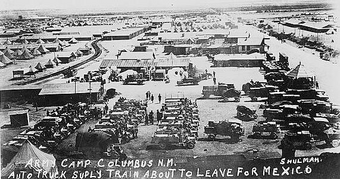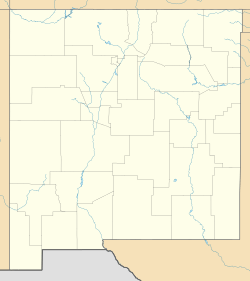Village of Columbus and Camp Furlong facts for kids
|
Village of Columbus and Camp Furlong
|
|

Camp Furlong, circa 1916
|
|
| Location | Portions of Columbus and Pancho Villa State Park, Columbus, New Mexico |
|---|---|
| Area | 138 acres (56 ha) |
| Built | 1917 |
| Website | Official website: https://www.emnrd.nm.gov/spd/find-a-park/pancho-villa-state-park/ |
| NRHP reference No. | 75001164 |
Quick facts for kids Significant dates |
|
| Added to NRHP | May 15, 1975 |
| Designated NHLD | May 15, 1975 |
The Village of Columbus and Camp Furlong is a special place in New Mexico that remembers an important event from 1916. It's a National Historic Landmark District, which means it's recognized for its historical importance to the entire country.
This area tells the story of a surprise attack by a famous Mexican revolutionary, Pancho Villa, on the town of Columbus, New Mexico. It also highlights how the American military responded with an operation called the "Punitive Expedition", led by General John J. Pershing. These events happened during a time of big changes in the world, including World War I and the Mexican Revolution.
Contents
A Surprise Attack and Brave Response
On March 9, 1916, Camp Furlong was a military base for the 13th U.S. Cavalry. This group of soldiers was spread out along the border, keeping watch.
Early that morning, Pancho Villa's forces launched a surprise attack on Columbus. During the chaos, a brave officer named Lieutenant Lucas became a hero. Even though he was barefoot, he quickly set up machine guns in the town. He directed heavy fire against the attackers, causing many of Villa's soldiers to retreat back into Mexico.
Camp Furlong Becomes a Major Base
After the raid, Camp Furlong quickly grew into a huge military base. It was needed to protect against more attacks and to prepare for the "Punitive Expedition" into Mexico. General John J. Pershing led this expedition to find Pancho Villa.
Soldiers from the New Mexico National Guard were among the first to arrive. Then, many other military units came to support the troops heading into Mexico.
First Military Airfield in the U.S.
Columbus holds a special place in history for having the first tactical military airfield in the United States! The 1st Aero Squadron used Curtiss JN-3 Jenny biplanes for scouting and communication during the expedition. These early airplanes helped soldiers see what was happening from above. However, many of these aircraft were lost in crashes over the rugged Mexican mountains.
Camp Furlong also had important facilities for supplies and repairs. It was a hub for the early motor trucks used by the military. At its busiest, the camp was home to more than 5,000 troops.
After the Expedition
After the Punitive Expedition ended, the 24th Infantry Regiment was stationed at Camp Furlong. In 1919, they were called to help chase Pancho Villa's troops out of Ciudad Juarez, a city across the border.
Once the Mexican Revolution concluded, the military base became less important. By 1921, only about 100 soldiers remained. All troops left the area by 1923.
Exploring the Historic District Today
Today, you can visit several buildings from the time of Villa's 1916 raid in Pancho Villa State Park. These buildings are listed on the National Register of Historic Places because of their historical value.
- The 1902 U.S. Customs House
- Two adobe buildings from the Camp Furlong era
- The Camp Furlong Recreation Hall
The State Park also has a special visitor center. Here, you can find exhibits that tell the stories of Pancho Villa, the Columbus raid, and General Pershing's expedition.
Other Historic Sites in the Area
The historic district also includes other interesting places:
- The former airfield, located east of the state park.
- The old railroad station of the El Paso and Southwestern Railroad, which now houses the local historical society museum.
- The former Hoover Hotel, an adobe building that was one of the few structures to survive the raid. It now hosts a desert art gallery.
See also
 | William M. Jackson |
 | Juan E. Gilbert |
 | Neil deGrasse Tyson |



